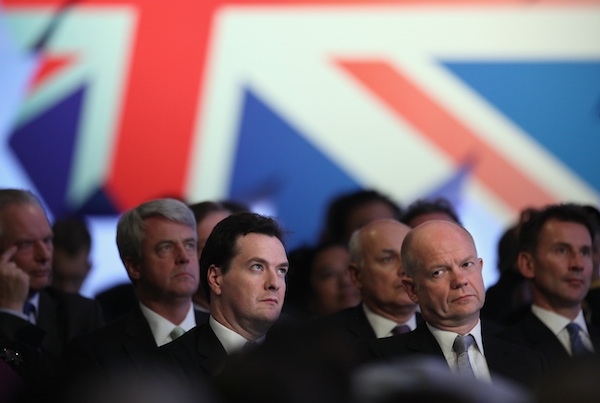Before the summer, the occupants of Downing Street were being worn down by coalition, battered by bad news and demoralised by dire economic data. One No. 10 source says: ‘We were all so depressed we wanted to slit our wrists. But now we’ve got our confidence back.’
This is just as well, for the electoral mountain they have to climb is now considerably steeper. With the boundary review went one of the central planks of the Tory plan for a majority, and Ed Miliband’s conference speech suggested that there’s more political life in him than many had appreciated.
But the Cameroons have justified reasons for optimism. First, the coalition is functioning again. The zero-sum politics of the past year, which did so much damage to both parties, has been replaced by an urgent sense that they both need the government to succeed. There’s even an expectation that an agreement will be reached on a trade-off between a ‘wealth tax’ and further welfare cuts.
The ‘wealth tax’ element is still under discussion. However, I expect it will not be what an economist would call a wealth tax but rather something a politician could. Given that responsibility, at the top and the bottom, is what voters most want now, any deal would be politically potent.
The facts are also beginning to move the Cameroons’ way. Welfare has been capped, most secondary schools will soon be academies and — most importantly — they are convinced that the economy is about to enter into a period of sustained (if unspectacular) growth. They look at a million more private sector jobs, rising exports, a revival in consumer spending and a record number of start-ups and conclude, albeit privately, that the green shoots are sprouting.
Cameron has told colleagues that his current message is best summed up by the refrain from West Side Story, ‘Hold my hand and we’re halfway there. Hold my hand and I’ll take you there.’ This optimism is shared by Tory Cabinet ministers who feel they are accumulating sufficient ammunition for a ‘we’re on the right track, don’t let the other guys screw it up’ election campaign. This will be made easier by the prominence on the Labour side of those who so messed it up last time. Tellingly, the coalition has maintained its lead on that most important measure — economic competence — even as the country has gone back into recession.
Another encouraging sign for the Tories is that the Cameroons, who are notorious for being late to the political fight, have finally grasped that they need to go on the offensive. Conference speeches matter less in government than they do in opposition; there is more than one day of the year when the Prime Minister can be certain of commanding the media’s attention. But Steve Hilton has nevertheless flown back from California to help — Cameron made him promise to do so when he left for a sabbatical last year — and the whole speechwriting team is at Chequers for an intensive drafting session.
In contrast to previous years, much of the speech will focus on Labour. Cameron will paint himself as someone who understands the changed, more competitive world, in contrast to a Labour party which is stuck in the past. This critique is motivated by the desire of George Osborne and the energetic new party chairman Grant Shapps to start shaping public perceptions of Labour now, instead of in the middle of an election campaign.
Extensive polling by Conservative campaign headquarters has revealed that the most resonant charge against Miliband is not the ‘weird’ one, which has been losing its potency as voters have got used to him, or even the ‘can you imagine him as prime minister?’ line. Rather, it is that he hasn’t faced up to the role that Labour’s borrowing and spending played in the current crisis.
The Tories have an unlikely accomplice in this attack, the shadow chancellor Ed Balls. That Balls always engages when anyone attacks the last Labour government’s fiscal record is a constant source of frustration for those closest to Miliband and of delight for the Tories. As one senior No. 10 source puts it: ‘Ed Balls is fighting all the old arguments. He’s facing backwards. He’s our best exponent.’
Miliband knows that he has to present himself as a change from both this government and the last Labour one. But Balls, with his fierce determination to defend its record, is a drag anchor on his leader.
To be sure, the Tory path to a majority leaves little room for error. The 40/40 strategy they are pursuing will see the party pouring resources into its 40 most vulnerable seats and the 40 seats it hopes to win off other parties. Even if the party took every one of these, it would still only have a 21-seat majority.
But Cameron’s brand remains the strongest among the party leaders. Add to that the prospects of an economic recovery and a new Tory sense of fairness and you can see why the Cameroons are more optimistic than they have been for a long time.







Comments